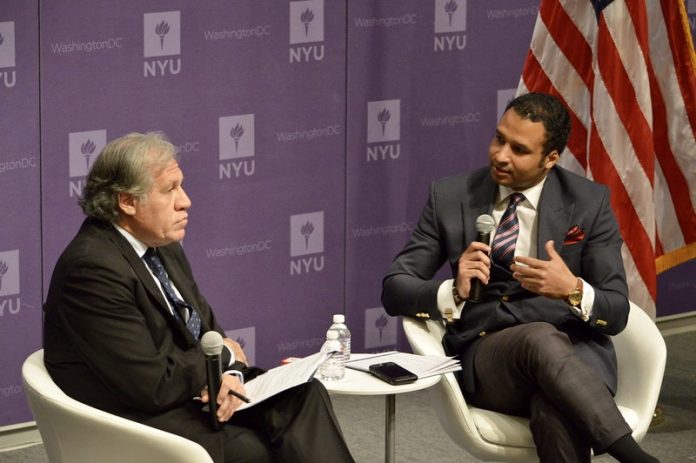On May 27, 2020, Luis Almagro was virtually sworn in for second term as Secretary General of the Organization of American States (OAS). This comes as the Western Hemisphere faces new and continuing challenges including the Coronavirus Pandemic, promoting regional development, defending democracy in the Americas, rising inequality, and an increasingly polarized political environment both within and between nations in the Hemisphere. The OAS must address these issues if it is going to remain relevant as the central organization for Hemispheric affairs. Yet, although these challenges are daunting, they represent opportunities for Almagro to strengthen the Inter-American System and the OAS.
In order for Almagro to best seize these opportunities, he must recognize and address the limitations of the OAS. Recognizing the comparative advantages of the OAS to serve as the lead institution on some issues will allow Almagro to more effectively coordinate the OAS response and delegate to nations and other institutions so that these challenges can be more holistically addressed.
Limitations for the OAS
Despite these numerous challenges that Almagro will have to face during his second term as Secretary General, the current positioning of the OAS within the Inter-American system may pose further institutional challenges for Almagro. Although the Organization of American States is the one of the oldest elements of the Inter-American System, there are numerous organizations that limit the extent to which the OAS represents hemispheric interests and provides states with options to use multilateral institutions to bypass the Organization of American States.
Making matters all the more difficult for the OAS to address the challenges that are facing the hemisphere is the inherent contradiction in the core objectives of the institution. The OAS mission is centered on four key pillars; 1) democracy, 2) human rights, 3) security, and 4) development. While all of these pillars are important and have their own historical legacies, they pose internal contradictions for the institution. The pillar of security in particular has a unique history that creates challenges for addressing the other missions of the institution. While the OAS has teams devoted to combatting terrorism and multi-dimensional security, one of the core rationales for the security pillar was defending national sovereignty. This creates complications for the OAS promotion of human rights and defense of democracy as they often require actions at odds with the interests of national leaders who may be the perpetuators of human rights violations and democratic backsliding.
While these limitations hinder Almagro’s efforts to address the challenges that face the Western Hemisphere, they are not insurmountable. The existence of a plethora of regional organizations poses challenges for the OAS taking a leadership role in all of the challenges facing the Americas, but also allows Almagro to determine where the OAS has a comparative advantage to take the lead on issues and where it would better serve as a coordinating force. For Almagro to maintain the OAS as the central political organ of the Inter-American system, he will have to prove that the OAS remains independent and serves the interests of all member states. This requires strengthening the OAS and leaning into the organization’s comparative advantages.
In addressing the tension between action and sovereignty, Almagro will have to walk a fine line. Over the course of his first term, Almagro chartered a more activist role for the OAS. Some have claimed this was an inappropriate overreach of the organization while others have suggested that Almagro has only acted on his own political biases. This has created polarization within Inter-American affairs that will make addressing the challenges facing the Western Hemisphere more difficult for Almagro. Finding ways for the OAS to depoliticize some of the crises may allow Almagro and the OAS to garner support for promoting the institution’s interests and strengthen the OAS’s ability to address these crises.
Addressing the Challenges Facing the Hemisphere
As Almagro begins his second term, the Hemisphere is plagued by numerous challenges. Perhaps the clearest threat in the Americas is the spread of the Coronavirus Pandemic. This pandemic exacerbates existing problems and makes these other challenges more difficult to address. The pandemic also provides cover for leaders to pursue undemocratic actions and consolidate their hold on power. In order to reposition the OAS to best address these challenges, Almagro will have to determine where the OAS has a comparative advantage.
During Almagro’s first term as Secretary General, one of his key priorities was strengthening the Inter-American Defense of Democracy regime. The OAS has a long history of promoting human rights and democracy in the Americas. In promoting human rights and democracy, the OAS is equipped with tools that have allowed it to play an active role in the hemisphere; the Inter-American Commission on Human Rights and the Inter-American Democratic Charter. Despite some of the concerns surrounding the role of the OAS in ways that contradict the institution’s commitment to national sovereignty, these two tools provide the impetus and duty for the Organization to tackle these issues.
While the OAS and the Inter-American Commission on Human Rights have historically played an important role in the Americas, the Inter-American Defense of Democracy Regime is relatively new. Building upon Resolution 1080 and the Washington Protocol, the OAS ratified the Inter-American Democratic Charter in 2001. Sections 2 and 3 of the Democratic Charter highlight the importance of democracy for both sustainable development and human rights. Since its passage, however, the Democratic Charter has been underutilized. While Almagro expanded the use of the Democratic Charter in his first term, critics have suggested that this has been done in a biased manner. Almagro must find ways to strengthen the defense of democracy by showing his independence and highlighting his commitment to democracy. Building upon the OAS’s commitment to the defense of democracy and human rights promotion provides a framework to effectively articulate its role in Inter-American Affairs and coordinate the responses to other challenges facing the Americas.
While organizations like the Pan-American Health Organization (PAHO) may be better equipped to address the public health aspects of the Coronavirus Pandemic, this does not mean that there is no role for the Organization of American States in responding to the pandemic. Rather than trying to replicate the work that is being done by PAHO and others, the OAS should seek its niche where it can best serve the citizens of the Americas. Almagro has suggested one area where the OAS should play a more active role; in ensuring that political and human rights are protected during the pandemic response. To this end, the OAS has put out guides on how to protect rights in addressing the pandemic. Working with PAHO and the health ministries of member states to ensure that their respective responses do not infringe on the rights of society is crucial and one where the OAS can have an important impact.
Likewise, the OAS does not have the budgetary capacity to be the leading regional actor when it comes to promoting economic development. Institutions, like the Inter-American Development Bank, have substantially larger budgets and expertise in the development field. These institutions should take a leading role in responding to the development challenges associated with the pandemic. However, the OAS’s Pan-American Development Foundation (PADF) serves as an important vector to promote development. Although the PADF has a relatively small budget, the OAS can use Foundation to pilot programs that can later be expanded by other larger regional bodies. Using the PADF to pilot programs at a smaller scale can ensure that human rights and democratic principles are upheld in program implementation and outcomes.
Latin America is regularly called the most unequal region in the world. Given the number of organizations that focus on economic inequality and budgetary constraints, the OAS may not be the best equipped to deal with economic inequality. However, inequality has important implications for the rights and dignity of individuals. Almagro can leverage his second term not to focus just on the defense of democracy in cases of abuse, but in promoting the equitable voice of citizens across the Americas within the democratic process. This could include giving civil society a greater voice in hemispheric affairs and ensuring that citizens are aware of their rights so they can more holistically participate in the political process.
Chartering a Course for the OAS
The current situation in the Western Hemisphere is particularly perilous. The region is caught in a storm of economic and political turmoil that is only being exacerbated by the ongoing Coronavirus Pandemic. Leaders, both within countries as well as within international organizations, will have to find a way to successfully navigate these challenges. Almagro is uniquely positioned to address these challenges through the OAS. While chartering a course through this storm will not be easy, if Almagro does so successfully, he has the opportunity to strengthen the role of the Organization of American States and to fulfill his objective of providing “more rights for more people.”
The views and opinions expressed in this article are those of the author.

The author is a consultant and specialist in Latin American public and foreign affairs. His work has been featured in The National Interest, Global Americans, Charged Affairs, and Diplomatic Courier among others. He holds an MA from the Josef Korbel School of International Studies and a BA from Tulane University where he triple majored in International Relations, Economics, and Latin American Studies. He is also pursuing his doctoral studies in International Relations.


